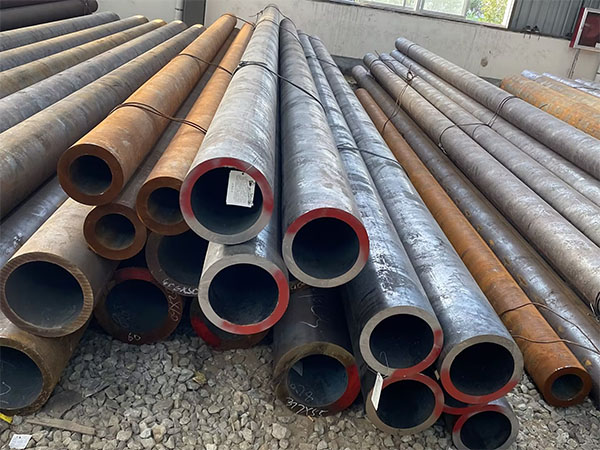Alloy steel pipe refers to the steel pipe made by adding one or more alloy metals (such as chromium, nickel, molybdenum, vanadium, titanium, etc.) to the carbon steel substrate. The addition of these alloying elements can effectively improve the mechanical and chemical properties of steel.
Alloy steel can be divided into high alloy steel and low alloy steel two kinds. The alloy content of low-alloy steel is less than 5%, and the alloy content of high-alloy steel is between 5% and 50%.

The type of alloy steel pipe
There are two main types of alloy steel pipe:
seamless pipe and welded pipe. The seamless alloy steel pipe is produced by the seamless process, which is completed by the solid billet through the perforation, rolling and other processes. Alloy steel welded pipes are made by crimping one or more steel plates together. Welded tubes are cheaper and easier to produce in large quantities, while seamless tubes are more robust and suitable for use in high-pressure environments.
The thickness of alloy steel pipe: the thickness of alloy steel pipe ranges from 0.3-50mm. The thickness of welded pipe is usually 1.0-15.0mm.
Chemical composition of alloy steel pipe: Carbon: 0.05-0.15%, Chromium: 1.00-1.50%, manganese: 0.30-0.60%, Phosphorus: 0.025% (max), sulfur: 0.025% (max), molybdenum: 0.44-0.65%, silicon: 0.50-1.00.
Mechanical properties: Due to the addition of alloying elements, alloy steel pipes are usually stronger than traditional carbon steel pipes, and due to the lower carbon content, alloy steel pipes also have higher high temperature resistance and better weldability than carbon steel pipes. In addition, under various temperatures or pressures, the ductility of alloy steel pipes is also better than that of standard carbon steel pipes.
Tensile strength (MPa) :415min, yield strength (MPa) : 205min, elongation (%) : 30min.
Grade of alloy steel pipe: Alloy steel pipes have a variety of grades, each grade has its own unique properties, Common grades are ASTM A335 Gr.P5, P9, P11, P12, P21, P22 & P91, ASTM A213-T5, T9, T11, T12, T22, T91, ASTM A691, etc. The performance of these grades varies. When selecting alloy steel pipes, the appropriate steel pipes should be selected according to the specific needs.
Types of alloy steel: There are many kinds of alloy steel, the common steel types are 4140 (chromium molybdenum steel), 4130 (chromium molybdenum silicon steel), 52100 (chromium steel), 1020 (carbon steel), 8620 (nickel chromium molybdenum steel) and T304/L (stainless steel). Each steel grade has its own unique properties and characteristics, which can be adapted to a variety of different use environments.
Performance characteristics of alloy steel pipe
Good corrosion resistance: alloy steel pipe added alloy components (such as chromium, nickel, molybdenum, etc.), so that the surface of the steel pipe formed a dense oxide film, can effectively resist the erosion of acidic substances, thereby improving the corrosion resistance of the pipe, suitable for chemical, Marine and acidic media and other harsh environment.
High temperature resistance: Some alloy steel pipes are designed for high temperature environment, can maintain stable mechanical properties and oxidation resistance in high temperature environment, suitable for boilers, heat exchangers and high temperature transportation systems.
Good processing and welding performance: After the appropriate ratio and control process, alloy steel pipe can still maintain good performance during processing and welding, which is easy to manufacture and install on site, but it may require stricter process parameter control than ordinary carbon steel.
Good toughness and fatigue resistance: The addition of alloying elements and optimized heat treatment process make the steel pipe have excellent impact resistance and fatigue properties, and can work stably under dynamic load conditions for a long time.
Advantages and market outlook
Excellent overall performance
Alloy steel pipe combines high strength, high temperature stability, excellent corrosion resistance and excellent fatigue resistance, and can adapt to extreme working environments, which makes it the preferred material for key equipment in the petroleum, chemical, power generation and other industries.
Reliability and safety
Due to the strict control of the manufacturing process and heat treatment process, the alloy steel pipe can maintain stable mechanical properties and reliable sealing in long-term high-load service, and significantly reduce safety risks.
Continuous progress of technology
With the application of new materials and new processes, alloy steel pipes will continue to improve in performance, corrosion resistance and economy to further meet the growing high-performance requirements of industries such as oil and gas, chemical and high-temperature equipment.
Conclusion
With its high strength, good toughness, excellent high temperature resistance and corrosion resistance, alloy steel pipes play a vital role in modern industry, especially in oil and gas, chemical industry and power generation. It relies on advanced manufacturing processes, precise heat treatment and rigorous quality testing to ensure long-term stable mechanical properties and safety reliability under extreme conditions.
